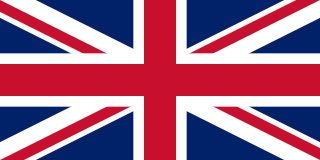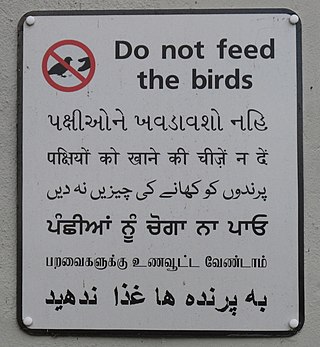
The United Kingdom of Great Britain and Northern Ireland, commonly known as the United Kingdom (UK) or Britain, is a country in Northwestern Europe, off the north-western coast of the continental mainland. It comprises England, Scotland, Wales, and Northern Ireland. It includes the island of Great Britain, the north-eastern part of the island of Ireland, and most of the smaller islands within the British Isles. Northern Ireland shares a land border with the Republic of Ireland; otherwise, the United Kingdom is surrounded by the Atlantic Ocean, the North Sea, the English Channel, the Celtic Sea, and the Irish Sea. The total area of the United Kingdom is 94,060 square miles (243,610 km2), with an estimated 2022 population of nearly 67 million people.

British Sign Language (BSL) is a sign language used in the United Kingdom and is the first or preferred language among the deaf community in the UK. While private correspondence from William Stokoe hinted at a formal name for the language in 1960, the first usage of the term "British Sign Language" in an academic publication was likely by Aaron Cicourel. Based on the percentage of people who reported 'using British Sign Language at home' on the 2011 Scottish Census, the British Deaf Association estimates there are 151,000 BSL users in the UK, of whom 87,000 are Deaf. By contrast, in the 2011 England and Wales Census 15,000 people living in England and Wales reported themselves using BSL as their main language. People who are not deaf may also use BSL, as hearing relatives of deaf people, sign language interpreters or as a result of other contact with the British Deaf community. The language makes use of space and involves movement of the hands, body, face and head.

A legislative consent motion is a motion passed by either the Scottish Parliament, Senedd, or Northern Ireland Assembly, in which it consents that the Parliament of the United Kingdom may pass legislation on a devolved issue over which the devolved government has regular legislative authority.

English, in various dialects, is the most widely spoken language of the United Kingdom, but a number of regional and migrant languages are also spoken. Regional indigenous languages are Scots and Ulster Scots and the Celtic languages, Irish, Scottish Gaelic, Welsh and, as a revived language with few speakers, Cornish. British Sign Language is also used. There are also many languages spoken by immigrants who arrived recently to the United Kingdom, mainly within inner city areas; these languages are mainly from continental Europe and South Asia.

The Gender Recognition Act 2004 is an act of the Parliament of the United Kingdom that allows people who have gender dysphoria to change their legal gender. It came into effect on 4 April 2005.
The Law Officers are the senior legal advisors to His Majesty's Government of the United Kingdom and devolved governments of Northern Ireland, Scotland and Wales. They are variously referred to as the Attorney General, Solicitor General, Lord Advocate, or Advocate General depending on seniority and geography - though other terms are also in use, such as the Counsel General for Wales. Law Officers in these roles are distinguished by being political appointees, while also being bound by the duties of independence, justice and confidentiality among the other typical professional commitments of lawyers. These roles do not have any direct oversight of prosecutions nor do they directly lead or influence criminal investigations. This is a distinguishing factor between Law Officers and the State Attorneys General of the United States or US Attorney General.
Civil partnership in the United Kingdom is a form of civil union between couples open to both same-sex couples and opposite-sex couples. It was introduced via the Civil Partnership Act 2004 by the Labour government. The Act initially permitted only same-sex couples to form civil partnerships, but the law was expanded to include opposite-sex couples in 2019.
Same-sex marriage is legal in all parts of the United Kingdom. As marriage is a devolved legislative matter, different parts of the United Kingdom legalised at different times; it has been recognised and performed in England and Wales since March 2014, in Scotland since December 2014, and in Northern Ireland since January 2020. Civil partnerships, which offer most, but not all, of the rights and benefits of marriage, have been recognised since 2005.

New Zealand Sign Language or NZSL is the main language of the deaf community in New Zealand. It became an official language of New Zealand in April 2006 under the New Zealand Sign Language Act 2006. The purpose of the act was to create rights and obligations in the use of NZSL throughout the legal system and to ensure that the Deaf community had the same access to government information and services as everybody else. According to the 2013 Census, over 20,000 New Zealanders know NZSL.

Irish Sign Language is the sign language of Ireland, used primarily in the Republic of Ireland. It is also used in Northern Ireland, alongside British Sign Language (BSL). Irish Sign Language is more closely related to French Sign Language (LSF) than to BSL, though it has influence from both languages. It has influenced sign languages in Australia and South Africa, and has little relation to either spoken Irish or English. ISL is unique among sign languages for having different gendered versions due to men and women being taught it at different schools all over Ireland.

Rosemary Elizabeth Cooper is a British health official and former politician. Cooper was a Liberal and later Liberal Democrat member of the Liverpool City Council from 1973 until 1999, when she joined the Labour Party. After leaving the council the following year, she was the Labour Member of Parliament (MP) for West Lancashire from 2005 until her resignation in 2022, when she was named chair of the Mersey Care NHS Foundation Trust.
The legal recognition of signed languages differs widely. In some jurisdictions, a signed language is recognised as an official language; in others, it has a protected status in certain areas. Although a government may stipulate in its constitution that a "signed language" is recognised, it may fail to specify which signed language; several different signed languages may be commonly used.

The languages of Wales include the Welsh language, which is an official language of Wales, and English, which is also considered an official language in Wales. The official languages of the Senedd are also Welsh and English. According to the 2021 census, the Welsh-speaking population of Wales aged three or older was 17.8% and nearly three quarters of the population in Wales said they had no Welsh language skills.

In the United Kingdom, devolution is the Parliament of the United Kingdom's statutory granting of a greater level of self-government to the Scottish Parliament, the Senedd, the Northern Ireland Assembly and the London Assembly and to their associated executive bodies: the Scottish Government, the Welsh Government, the Northern Ireland Executive and in England, the Greater London Authority and combined authorities.

The European Union (Withdrawal) Act 2018 is an Act of the Parliament of the United Kingdom to repeal the European Communities Act 1972, and for parliamentary approval to be required for any withdrawal agreement negotiated between the Government of the United Kingdom and the European Union. Initially proposed as the Great Repeal Bill, its passage through both Houses of Parliament was completed on 20 June 2018 and it became law by Royal Assent on 26 June.

The United Kingdom Internal Market Act 2020 is an act of the Parliament of the United Kingdom passed in December 2020. Its purpose is to prevent internal trade barriers within the UK, and to restrict the legislative powers of the devolved administrations in economic matters. It is one of several pieces of legislation concerning trade that were passed following the European Union membership referendum, as after Brexit the UK is no longer subject to EU law. It introduces principles of mutual recognition and non-discrimination into UK trade law.
Clark Denmark is a British activist, lecturer and interpreter. He is deaf and a British Sign Language (BSL) user, and he is widely recognised within the Deaf community for his role in advancing the recognition and wider understanding of BSL.
Lilian Keddie Lawson, OBE, is a Scottish linguist and activist. She is Deaf and a British Sign Language user.

The Gender Recognition Reform (Scotland) Bill is a bill passed by the Scottish Parliament. The bill seeks to amend the Gender Recognition Act 2004 of the Parliament of the United Kingdom, making it simpler for people to change their legal gender. On 17 January 2023, the United Kingdom government used section 35 of the Scotland Act 1998 to block the bill from receiving royal assent, the first time section 35 has been used.

Welsh devolution is the transfer of legislative power for self-governance to Wales by the Government of the United Kingdom.











